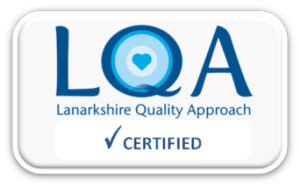Transition from the Paediatric to the Adult Dietetic Service
Information for patients
NHS Lanarkshire Dietetic Department
PIL.PAEDAS.22_12580.L
What is Transition?
The term ‘transition’ describes the process of moving from one stage in life to another. For example, going from being a child to becoming an adult.
The young person you support is moving from Children and Young Peoples Services. This means that their dietetic care will be transferred to one of the following services within NHS Lanarkshire:
- Specialist Adult Learning Disability Dietitians;
- Adult Enteral Feeding Dietitians or
- Specialist condition specific dietetic team e.g. Gastro dietitian or Cystic Fibrosis dietitian. These specialist teams may be based in another hospital or health board area.
The way that the dietetic service is provided may be slightly different to what you have been used to when under Children and Young Peoples services. This leaflet aims to explain more about this.
Working with Others
The Learning Disability Dietitians are part of a multi-disciplinary learning disability team which also includes the following people:
- Psychiatry
- Psychology
- Physiotherapy
- Speech and Language Therapy
- Nursing
- Occupational Therapy
- Podiatry
- Pharmacy
The specialist Adult Enteral Feeding Dietitians also work closely with a number of specialists from the multi-disciplinary team. They will be able to give you advice on any issues you are having with your child/grandchild’s feeding.
Feed and Equipment Delivery
Your child/grandchild’s supply of feeds will change to Abbott ‘Hospital to Home’ delivery service, or your GP surgery/local pharmacy. Your new Dietitian will contact GP’s, consultants, specialist nurses and other health professionals as required to let them know what is happening.
Equipment such as: giving sets; feeding pumps; backpacks; and drip stands will now be supplied by Abbott ‘Hospital to Home’. Equipment such as: syringes; replacement tubes; extension sets; and y ports will also now come from Abbott ‘Hospital to Home’. You should get these from the health visiting or public health nurses for schools team at the moment.
During the transition period, you will meet the Abbott ‘Hospital to Home’ Nurse who will be your contact if you have any tube or stoma site problems when your child moves to adult services. The Children’s Community Nursing team may also be involved with your child’s care until the adult services have completely taken over.
People giving care to your child/grandchild when they move into adult services often need to be given a feeding regime for them. Your dietitian will be able to give this. It will follow NHS Lanarkshire’s best practice guidelines
Meeting the Adult dietitian
Your paediatric dietitian will start to discuss the transition with you some time after your child/grandchild’s 16th birthday. We will aim to have your child/grandchild’s transition to adult services complete by the time they are around 16-18 years old, or when they leave school (whichever comes first). Every young person and their family is different, and we will aim to do what suits you best whenever we can.
We will try to have joint appointments with both the paediatric and adult dietitians there, and we will work together with you and your child/grandchild to try to make the process as easy as possible. Until the transition is complete, the paediatric dietitian will stay in charge of your child/grandchild’s dietetic care and the adult dietitian will be able to spend some time getting to know you and your child/grandchild.
Review by the Adult Dietitian
The Dietitian will discuss with you the most suitable place to carry out a review appointment e.g. clinic, day placement, home visit (if required). They can also offer telephone reviews and Near Me video calls if this is suitable.
There may be times when student dietitians or dietetic assistants are present at appointments. If you don’t want this for any appointments, please let your dietitian know.
When carrying out a dietetic review they may do the following:
- Check height/ weight.
- Discuss feeding regimen and tolerance.
- Check the stoma site.
- Discuss any feeding equipment issues.
- Discuss training needs e.g. for day care/respite staff.
- Arrange a date for the next review.
The adult dietitians will aim to carry out a dietetic review at least 2 times each year. Please speak to your dietitian for further information.
Pub. date: June 2022
Review date: June 2024
Issue No: 01
Reference: PIL.PAEDAS.22_12580.L
If you need this information in another language or format, please e-mail:





